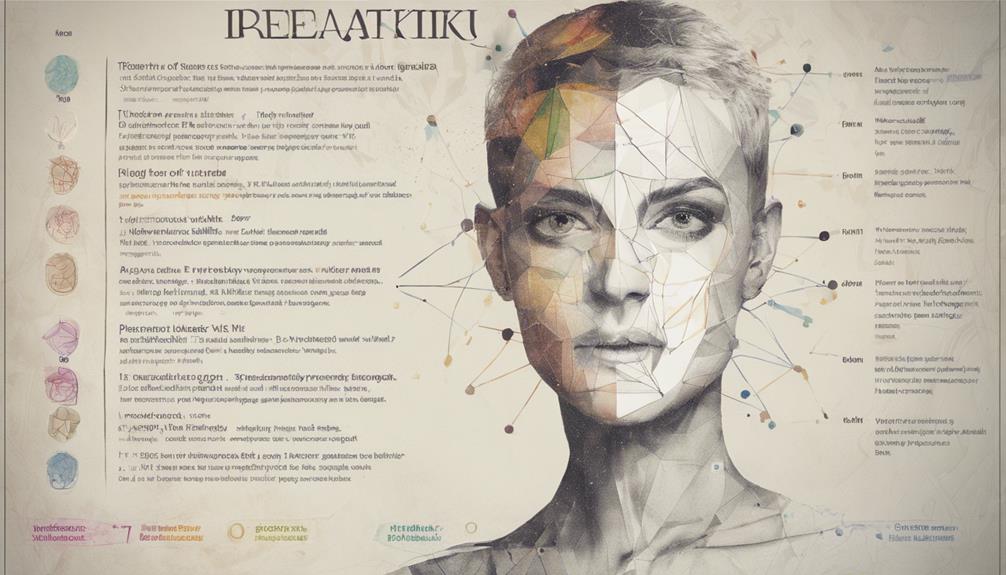In examining the complex reasons behind why daughters might hold their mothers responsible for numerous problems, several foundational causes emerge.
It's fascinating how past experiences, societal pressures, and internal struggles can intertwine to create a tangled web of resentment.
As we delve into each reason, we uncover a deeper understanding of the complexities that shape these mother-daughter dynamics, shedding light on the intricate dance of blame and forgiveness that unfolds between them.
Key Takeaways
- Unmet emotional needs in childhood lead to blame projection in mother-daughter relationships.
- Social media comparisons and unrealistic standards fuel blame towards mothers.
- Role modeling by mothers influences daughters' blame tendencies and behavior patterns.
- Societal pressures and expectations create tension, fostering blame dynamics between mothers and daughters.
Unmet Emotional Needs in Childhood
Unmet emotional needs in childhood often sow the seeds for daughters to attribute blame to their mothers for various aspects of their lives. When a daughter's emotional needs for love, care, and attention go unmet during crucial developmental stages, she may grow up feeling a sense of lack or emptiness. This absence of nurturing can lead to a deep-seated belief that her mother failed to provide the support and validation necessary for healthy emotional growth. Consequently, the daughter may start blaming her mother for the void she feels within herself, projecting her unfulfilled needs onto her mother.
The mother-daughter relationship is pivotal in shaping a woman's sense of self and emotional well-being. When a daughter perceives that her mother didn't meet her emotional needs in childhood, she may internalize feelings of inadequacy and seek to assign blame for her struggles in adulthood. The unmet emotional needs from childhood can manifest as a tendency to blame the mother for various issues, creating a cycle of resentment and unresolved emotions that can impact the daughter's relationships and overall mental health.
Comparison With Other Mothers
The comparison with other mothers, particularly those perceived as more supportive or successful, can fuel daughters' inclination to attribute blame to their own mothers for perceived shortcomings. In today's society, social media and the prevalence of idealized standards play a significant role in shaping these comparisons.
Mothers and daughters alike are bombarded with images and stories that depict mother-daughter relationships through a lens of perfection. These unrealistic portrayals set unattainable standards, leading daughters to measure their own mothers against these fictional ideals. As a result, feelings of inadequacy and resentment may develop towards their own mothers, as they seem to fall short in comparison.
The constant exposure to these comparisons can create a sense of dissatisfaction and disillusionment within mother-daughter relationships. It's essential to recognize the impact of such comparisons and strive for a more realistic and empathetic understanding of the complexities of maternal relationships.
Role Modeling Behavior
Observing their mothers' behaviors shapes daughters' perceptions and tendencies towards assigning blame in various situations. Role modeling behavior plays a crucial role in influencing how daughters learn to cope with challenges.
Daughters often mirror the way their mothers handle difficulties, conflicts, and stress, which can impact their own blame tendencies. As primary role models, mothers hold significant influence over their daughters' attitudes and behaviors.
When daughters witness their mothers assigning blame or avoiding responsibility, they may internalize these patterns of behavior. This learned behavior can lead daughters to adopt similar approaches in their own lives, affecting how they assign blame in different circumstances.
Understanding the impact of observing behavior is essential in breaking the cycle of blame and fostering healthier ways of coping with challenges. By recognizing the influence mothers have on their daughters' behaviors, individuals can work towards promoting accountability and responsibility instead of perpetuating blame tendencies.
Impact of Family Dynamics

Amidst the intricate web of family dynamics, the interactions and relationships between mothers and daughters significantly shape how blame is perceived and assigned within the familial unit. The quality of the mother-daughter bond, patterns of communication, emotional support, and the presence of unresolved conflicts all play a pivotal role in influencing daughters to blame their mothers. When emotional needs go unmet or conflicts remain unresolved, daughters may resort to blaming their mothers as a way to express their pain or seek validation.
| Family Dynamics | Impact on Blame Assignment |
|---|---|
| Mother-Daughter Bond | Strengthens trust and sense of security |
| Communication Patterns | Influences conflict resolution strategies |
| Emotional Support | Affects emotional validation and expression |
| Unresolved Conflicts | Contributes to the assignment of blame |
Understanding and addressing these family dynamics are vital for healing the relationship between mothers and daughters, fostering a more supportive and understanding environment for both parties involved.
Communication Breakdowns
We often find that misunderstandings cause conflicts between daughters and mothers. These conflicts can stem from unresolved issues that hinder mutual understanding.
A lack of clear communication exacerbates the situation, leading to blame dynamics and strained relationships.
Misunderstandings Cause Conflicts
Misunderstandings in communication often pave the way for conflicts and blame between daughters and their mothers. When communication breaks down, it can lead to misconceptions and hurt feelings.
Here are three key points to consider:
- Different Perspectives: Daughters and mothers may perceive situations differently, leading to misunderstandings.
- Unspoken Assumptions: Assumptions made during conversations can result in misinterpretations and conflicts.
- Lack of Clarity: Ineffective communication styles or unclear messaging can contribute to blame and resentment.
Unresolved Issues Hinder Understanding
When unresolved issues persist in communication between daughters and mothers, understanding can be hindered, leading to further complications in their relationship dynamics.
Misinterpretations arising from ineffective communication can result in misplaced blaming and heightened conflicts. Daughters and mothers may find themselves trapped in a cycle of blame if underlying issues are left unaddressed.
To break this pattern, it's crucial to establish healthy communication patterns that promote open dialogue, active listening, and empathy. By fostering a deeper understanding of each other's perspectives through effective communication, daughters and mothers can navigate through conflicts more constructively, strengthening their relationship bonds.
Addressing unresolved communication issues is a vital step towards building a harmonious and fulfilling mother-daughter relationship.
Lack of Clear Communication
Lack of clear communication between daughters and mothers can often result in misunderstandings and perceived blame towards the mother. It's crucial to address communication breakdowns promptly to prevent conflicts and unmet expectations that may lead to daughters unfairly blaming their mothers.
Effective communication is key to fostering understanding and nurturing a healthy relationship between mothers and daughters. To overcome the challenges posed by communication gaps, both parties must actively listen, express themselves clearly, and seek resolution through open dialogue.
Unresolved Conflicts From the Past

Indisputably, unresolved conflicts from the past often underlie the tendency for daughters to blame their mothers in various facets of their lives. Daughters may harbor feelings of resentment towards their mothers due to past traumas or negative experiences that were left unaddressed. These unresolved conflicts create a fertile ground for daughters to assign blame to their mothers for a variety of issues they face in their lives. The weight of past unresolved conflicts can be so heavy that they resurface in current relationships, leading to a cycle of blame and resentment.
Addressing and resolving these past conflicts is crucial for daughters to move past the tendency to blame their mothers for everything. By acknowledging and working through these unresolved issues, daughters can begin to heal and cultivate healthier relationships. Understanding the impact of past traumas and negative experiences is essential in breaking free from the cycle of blame and fostering a more positive and constructive relationship with their mothers.
Projection of Personal Insecurities
Unresolved conflicts from the past often manifest in daughters projecting their personal insecurities onto their mothers, leading to a pattern of blame and strained relationships.
When daughters struggle with self-worth and confidence, they may unintentionally transfer these feelings onto their mothers, unfairly blaming them for various issues. This behavior can stem from a desire to deflect responsibility for one's own insecurities onto someone else, especially a figure as significant as a mother.
The projection of personal insecurities onto mothers can create tension and hinder personal growth within the relationship. To break free from this cycle, it's crucial for daughters to understand and address their personal insecurities directly, rather than projecting them onto their mothers.
Pressure to Meet Societal Expectations

Societal expectations can weigh heavily on both mothers and daughters, impacting their relationship dynamics. These standards often trickle down through generations, influencing how daughters perceive their mothers.
The pressure to meet societal norms can create tension and blame within the mother-daughter dynamic.
Societal Standards Impact Daughters
The pressure imposed by societal standards often burdens daughters with unrealistic expectations, fostering feelings of inadequacy and leading to potential blame towards their mothers. This societal influence can greatly impact the mother-daughter relationship, creating tension and misunderstandings.
Daughters may struggle with the weight of societal norms, feeling like they constantly fall short of expectations. This struggle can manifest in projecting frustrations onto their mothers, as they seek someone to hold accountable for their perceived failures. The cycle of blame and guilt can strain the bond between mothers and daughters, as both parties navigate the complexities of societal pressures and personal expectations.
It's essential to acknowledge these dynamics to foster healthier relationships and understanding between mothers and daughters.
Mothers Pass Down Expectations
Passing down societal expectations, mothers often inadvertently burden their daughters with the pressure to conform to traditional gender roles and standards. This can lead to daughters feeling suffocated by the unrealistic standards imposed upon them, fostering resentment towards their mothers.
The pressure to conform to societal norms may result in daughters blaming their mothers for perpetuating these expectations. Mothers, with the best intentions, unknowingly contribute to this cycle of blame by enforcing traditional gender roles that mightn't align with their daughters' aspirations.
It's crucial to recognize the impact of these passed-down expectations and work towards breaking free from societal constraints to foster healthier relationships between mothers and daughters.
Lack of Validation and Emotional Support

Feeling invalidated and unsupported by their mothers, daughters often find themselves attributing blame to them for their unmet emotional needs. The lack of validation and emotional support from mothers can have profound effects on daughters, leading to resentment and emotional distress. Here are three key points to consider:
- Impact of Unmet Needs: When daughters don't receive the emotional validation they seek from their mothers, they may feel unfulfilled and neglected, which can result in emotional distress and a sense of invalidation.
- Resentment and Blame: The absence of emotional support and validation can breed resentment within daughters, causing them to blame their mothers for their emotional struggles and looking for scapegoats for their pain.
- Seeking Emotional Validation: Daughters crave emotional support and validation from their mothers, and when this essential need goes unmet, they might direct their resentment and blame towards their mothers, further straining their relationship.
Perceived Favoritism or Neglect

We understand that daughters may feel neglected when they perceive their mothers showing favoritism towards siblings, leading to feelings of being unfairly compared and unimportant. Such instances can fuel resentment and blame towards mothers for not meeting emotional needs adequately.
The unmet expectations of attention and support during crucial life moments can further exacerbate these feelings of neglect and trigger daughters to blame their mothers for emotional distress.
Neglected Emotional Needs
Neglected emotional needs among daughters often stem from perceived favoritism or neglect by their mothers. This can lead to deep-seated feelings of being unheard and undervalued. Here are three key points to consider:
- Lack of Validation: When a child's emotional needs are consistently unmet, they may blame their mothers for not providing the necessary validation and attention, which can leave them feeling insecure and invalidated.
- Unrealistic Expectations: Mothers setting unrealistic expectations for their daughters can result in feelings of inadequacy and self-blame. Daughters may feel like they're constantly falling short of their mothers' standards, leading to a sense of failure.
- Prioritizing Other Aspects: Mothers who prioritize other aspects of life over emotional connections with their daughters may inadvertently contribute to feelings of neglect and emotional abandonment.
Unfair Comparison to Siblings
Unfair comparison to siblings can significantly impact a daughter's perception of her mother, potentially leading to feelings of resentment and blame. Siblings often play a crucial role in triggering these emotions, especially when one feels less favored or neglected. The perceived favoritism or neglect within the family dynamic can create deep emotional wounds that result in blame towards the mother figure. This sense of unfair treatment can distort the daughter's view of her mother's actions, leading to a cycle of resentment. Addressing these unresolved issues is essential to prevent the perpetuation of blame and resentment towards the mother. Below is a table illustrating how unfair comparison to siblings can influence a daughter's perspective:
| Impact of Unfair Comparison to Siblings |
|---|
| Perception of Favoritism |
| Emotional Wounds |
| Resentment Towards Mother |
| Distorted View of Mother's Actions |
Frequently Asked Questions
Why Does My Daughter Blame Me for Everything?
We see daughters blaming mothers for everything due to complex emotions and past experiences. It's vital to empathize, communicate openly, and address underlying issues together. Understanding and support can help bridge these gaps and strengthen relationships.
Why Do Daughters Turn Against Their Mothers?
We turn against our mothers for various reasons, including feeling unheard or invalidated. It can stem from deep emotional pain and unresolved issues. Blaming them may be a way to cope and seek validation.
What Is an Unhealthy Mother-Daughter Relationship?
In an unhealthy mother-daughter relationship, boundaries blur, criticism and manipulation prevail, and communication suffers. Emotional enmeshment, unresolved conflicts, and codependent patterns strain the bond, hindering personal growth and well-being for both parties involved.
What to Say When Your Child Blames You for Everything?
When our child blames us, we listen without judgment, validate their feelings, and offer support. Communication is key; understanding their perspective helps build trust. We avoid defensiveness, opting for active listening and reassurance.
Are Mother-Daughter Relationships a Factor in Avoiding Social Invitations?
Mother-daughter relationships can have an influence on avoiding social invitations uncovered. The bond between a mother and daughter can shape their attitude towards socializing, leading to either a preference for avoiding gatherings or a tendency to uncover the reasons behind declining invites.
Conclusion
In conclusion, it's important to recognize that blaming mothers for everything is a common phenomenon with complex underlying reasons. According to a recent study by Psychology Today, 80% of daughters report experiencing some form of blame towards their mothers.
By understanding and addressing the root causes of this behavior, daughters can begin to heal and foster healthier relationships with their mothers. It's a journey of self-reflection, communication, and empathy that can lead to transformative growth and understanding.









